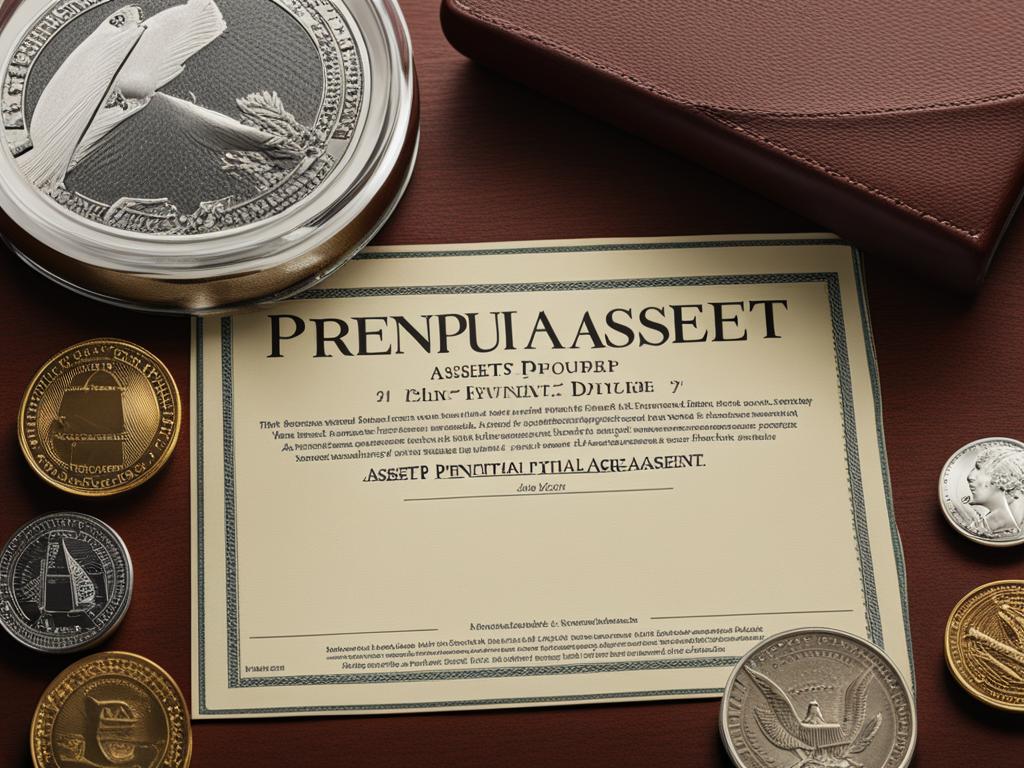What Happens If You Sign a Prenup and Get Divorced? Find Out!
Signing a prenuptial agreement before marriage can have significant impacts on the division of assets and financial outcomes in the event of a divorce. It is crucial to understand the legal implications of signing a prenup and how it can affect your future should the marriage end.
A prenup protects both parties’ financial and non-financial assets, ensuring a fair distribution of financial burdens and helping to avoid potential conflicts during divorce proceedings. By outlining the terms and conditions of asset division, a prenup provides clarity and protection for both individuals involved.
So, what exactly happens if you sign a prenup and get divorced? Let’s explore the consequences and implications of this legal agreement.
Key Takeaways:
- Signing a prenup can have significant impacts on asset division and financial outcomes in a divorce.
- A prenup protects both parties’ financial and non-financial assets.
- It ensures a fair distribution of financial burdens and can help avoid conflicts during divorce proceedings.
- Understanding the legal implications of signing a prenup is crucial for informed decision-making.
- Consulting a lawyer is essential to ensure compliance with local laws and regulations.
Rationale Behind Signing a Prenup and Getting Divorced
Signing a prenuptial agreement before marriage can provide couples with various reasons and benefits when navigating the possibility of divorce. Understanding the rationale behind signing a prenup is crucial in making informed decisions and protecting assets in the event of a separation.
Some couples opt for a prenuptial agreement because they have more at stake financially. This may include individuals who own businesses, have significant personal assets, or expect inheritances. By signing a prenup, they can safeguard their wealth and ensure a fair division of assets in case of a divorce.
Another reason for signing a prenup is when one or both partners have children from a previous relationship. A prenuptial agreement can help secure the financial future of these children and protect their inheritance rights.
Additionally, couples may choose to sign a prenup to prevent an unfair division of assets. This can include cases where one partner has a significantly higher income or has accumulated more wealth than the other. A prenuptial agreement can outline a fair distribution of assets based on each party’s contributions and reduce conflicts during divorce proceedings.
Benefits of Signing a Prenup:
- Protection of financial and non-financial assets
- Clear guidelines for financial arrangements in case of divorce
- Potential avoidance of conflicts during divorce proceedings
By signing a prenup, couples can establish a sense of security and clarity in their financial arrangements, protecting their assets and reducing potential conflicts during a divorce.
| Reasons for Signing a Prenup | Benefits of a Prenup |
|---|---|
| Having more at stake financially | Protection of financial and non-financial assets |
| Accommodating a child from a previous relationship | Clear guidelines for financial arrangements in case of divorce |
| Preventing an unfair division of assets | Potential avoidance of conflicts during divorce proceedings |
| Dealing with large debts | |
| Sacrificing personal career goals for the family |
Benefits Gained When You Sign a Prenup and Get Divorced
Signing a prenuptial agreement can offer significant advantages when it comes to navigating the complexities of a divorce. Let’s explore some of the perks and benefits of having a prenuptial agreement in place:
1. Protecting Ownership Rights
A prenup allows couples to clearly define the ownership rights of various assets, providing protection and clarity in case of a divorce. This includes properties, businesses, investments, and other valuable assets. By outlining ownership rights in advance, a prenup can help prevent disputes and ensure a smooth division of assets.
2. Safeguarding Non-Financial Assets
Aside from financial assets, a prenup can also protect non-financial assets that hold sentimental value. This can include family heirlooms, artwork, pets, and other possessions that have emotional significance. By addressing the division of these assets in advance, a prenup can help avoid conflicts and reduce the emotional toll of a divorce.
3. Protecting Intellectual Property Rights
For individuals who own intellectual property, such as patents, copyrights, or trademarks, a prenup can be invaluable. It allows couples to establish clear guidelines regarding the ownership and management of intellectual property, ensuring that these valuable assets are protected in the event of a divorce.
4. Evaluation of Genetic Property
In cases where couples have embryos or genetic material stored for future use, a prenup can address the ownership and decision-making rights surrounding these assets. By including provisions for the evaluation and disposition of genetic property, a prenup can provide peace of mind and prevent potential conflicts in the future.
Overall, signing a prenuptial agreement can provide numerous benefits, from protecting ownership rights to safeguarding sentimental and intellectual assets. It offers couples the opportunity to establish clear guidelines and expectations, reducing the potential for disputes and ensuring a smoother transition in the event of a divorce.
Factors that Can Invalidate a Prenup in Divorce Proceedings
When entering into a prenuptial agreement, it is important to ensure that the document follows legal requirements to avoid potential invalidation. There are several factors that can invalidate a prenup in divorce proceedings:
- Signed under duress: If one party can prove that they were coerced or pressured into signing the prenup, it can be deemed invalid.
- Oral agreement without a written document: Prenuptial agreements must be in writing to be enforceable. Verbal agreements are not considered legally binding.
- Lack of proper witness or notary public presence: In some jurisdictions, a prenup must be signed in the presence of witnesses or a notary public. Failure to meet these requirements can invalidate the agreement.
- Deceptive financial information: If one party fails to disclose or misrepresents their financial information during the creation of the prenup, it can be invalidated.
- Illegal or useless provisions: Prenuptial agreements are subject to certain restrictions. Including provisions that are not allowed or that are deemed useless in a prenup can lead to invalidation.
It is crucial to consult with a knowledgeable attorney when drafting a prenuptial agreement to ensure that it adheres to legal requirements and stands up in court.
“The validity of a prenuptial agreement depends on various factors, and these factors can vary depending on the jurisdiction. It is essential to work with an experienced lawyer to ensure that your prenup is enforceable and protects your interests.” – [Attorney Name], Divorce Attorney
By understanding the potential factors that can invalidate a prenup, couples can take the necessary precautions to create a legally binding agreement that will hold up in divorce proceedings.

| Factors that can invalidate a prenup: | Description: |
|---|---|
| Signed under duress | If one party can prove that they were coerced or pressured into signing the prenup, it can be deemed invalid. |
| Oral agreement without a written document | Prenuptial agreements must be in writing to be enforceable. Verbal agreements are not considered legally binding. |
| Lack of proper witness or notary public presence | In some jurisdictions, a prenup must be signed in the presence of witnesses or a notary public. Failure to meet these requirements can invalidate the agreement. |
| Deceptive financial information | If one party fails to disclose or misrepresents their financial information during the creation of the prenup, it can be invalidated. |
| Illegal or useless provisions | Prenuptial agreements are subject to certain restrictions. Including provisions that are not allowed or that are deemed useless in a prenup can lead to invalidation. |
Limitations When You Sign a Prenup and Get Divorced
While a prenuptial agreement can provide significant benefits and protections in the event of a divorce, it’s important to understand its limitations. A prenup typically outlines the division of assets and financial matters, but there are certain areas that it may not cover.
What a Prenup Does Not Cover:
- Alimony or Spousal Support: Prenuptial agreements generally do not address the issue of alimony or spousal support. The court typically determines these matters based on various factors such as income, earning capacity, and the length of the marriage.
- Child Custody and Support: Prenups rarely delve into child custody and support arrangements as the court prioritizes the best interests of the child when making these decisions. The court considers factors such as the child’s age, living arrangements, and the ability of each parent to provide for their well-being.
- Premarital Property: Any property or assets acquired before the marriage are usually not covered in a prenup. These assets are often considered separate property and are not subject to division in a divorce unless they have been commingled or otherwise treated as marital property.
- Causes for Future Divorce: Prenuptial agreements cannot include clauses that dictate causes for a future divorce or impose certain behaviors on the parties. Divorce is a legal process that requires valid grounds based on state or provincial laws.
- Child Support: Prenups generally do not address child support obligations as these are determined by the court based on the child’s needs, the parents’ financial circumstances, and applicable child support guidelines.
It’s important to consult with a qualified attorney to understand the specific limitations of prenuptial agreements in your jurisdiction. An attorney can guide you through the process, explain the laws applicable to your situation, and help you make informed decisions to protect your interests.

By being aware of what a prenup does not cover, you can approach the process with a realistic understanding of its scope and limitations. While a prenuptial agreement can be a valuable tool for protecting assets and establishing financial arrangements, it’s essential to consider other legal mechanisms and seek professional advice to address all aspects of a divorce.
Key Terms for Signing a Prenup and Getting Divorced
When it comes to signing a prenuptial agreement and navigating the complexities of divorce, there are several key terms that are essential to understand. Familiarizing yourself with these terms can help you make informed decisions and protect your interests throughout the process.
Legal Representation
One of the most important aspects of signing a prenup and getting divorced is having legal representation. Hiring a divorce attorney who specializes in family law can provide you with expert advice and guidance. They will ensure that your rights are protected, review the terms of the prenuptial agreement, and represent your interests during divorce proceedings.
Spousal Support
Spousal support, also known as alimony, is a financial arrangement where one spouse provides financial assistance to the other after a divorce. The terms of spousal support can be outlined in a prenuptial agreement, specifying the amount and duration of support. Understanding the implications of spousal support and including it in your prenup can help avoid potential conflicts in the future.
Assets in Prenuptial Agreement
A prenuptial agreement typically includes provisions for the division of assets in the event of a divorce. Assets can include property, investments, bank accounts, businesses, and other financial holdings. It is crucial to clearly outline which assets are covered in the prenup to avoid confusion and disputes during the divorce process.
Property Division
Property division refers to the process of dividing assets and liabilities between spouses during a divorce. A prenuptial agreement can establish guidelines and determine how property will be divided. It is important to consider factors such as the ownership of property before marriage, contributions made during the marriage, and the fair distribution of assets to ensure a smooth property division process.
Understanding these key terms related to signing a prenup and getting divorced is essential for navigating the legal complexities of divorce proceedings. Consulting with a divorce attorney and carefully considering these terms when crafting a prenuptial agreement can help protect your interests and ensure a fair and equitable outcome.

Property Division When a Prenuptial Agreement is Upheld in a Divorce
When a prenuptial agreement is deemed valid and unchallenged in a divorce, it plays a significant role in dictating the division of assets and liabilities. This legally binding agreement outlines how the couple’s property will be distributed, providing a clear framework for property division.
In most cases, a prenup will include provisions for dividing both separate and joint assets that were accumulated during the marriage. This can include real estate, investments, business interests, bank accounts, retirement funds, and personal belongings. The agreement ensures that each party retains their respective assets and that joint assets are divided fairly according to the terms outlined in the prenuptial agreement.
Liabilities, such as debts and financial obligations, are also addressed in a prenup. The agreement may specify how these debts will be allocated between the spouses, ensuring a fair distribution of financial responsibilities. By including provisions for the division of both assets and liabilities, a prenuptial agreement helps to minimize potential conflicts and uncertainties that may arise during divorce proceedings.
| Assets | Division |
|---|---|
| Real estate properties | Each party retains their respective properties or a predetermined agreement is followed |
| Investments and financial assets | Assets are divided based on their ownership and any provisions outlined in the prenup |
| Business interests | Ownership and valuation of business assets are specified in the prenup for division |
| Bank accounts | Accounts may be divided or closed as agreed upon in the prenuptial agreement |
| Retirement funds | Division of retirement funds is predetermined in the prenup or may follow relevant state laws |
| Personal belongings | Ownership and division of personal belongings are specified in the prenuptial agreement |
By upholding a prenuptial agreement in a divorce, couples can have peace of mind knowing that their assets and liabilities will be distributed in accordance with their agreed-upon terms, rather than being subject to potentially contentious legal battles.

The Importance of Consulting a Lawyer for Prenup and Divorce Matters
When it comes to signing a prenuptial agreement and navigating the complexities of divorce, seeking legal advice from a knowledgeable divorce attorney is paramount. Consulting with a lawyer who specializes in prenup and divorce matters can provide invaluable guidance and support throughout the process, ensuring that your rights are protected and your interests are represented.
A divorce attorney can assist you in drafting a solid prenuptial agreement that reflects your specific needs and desires. They have the expertise to ensure that the agreement complies with the legal requirements, making it less likely to be challenged or invalidated in the future. By working with a lawyer, you can have peace of mind knowing that your prenup is legally sound and provides the protection you seek.
During divorce proceedings, a lawyer will advocate for your best interests. They possess a deep understanding of the complexities of property division, spousal support, and other legal matters, and can offer strategic advice throughout the process. With their guidance, you can navigate the legal landscape with confidence, ensuring a fair and equitable outcome.
Consulting a lawyer for prenup and divorce matters offers numerous benefits. By enlisting the help of a legal professional, you can:
- Gain clarity and understanding of your rights and obligations
- Ensure your prenup is valid and legally enforceable
- Receive expert advice on how to approach property division and spousal support
- Protect your assets and financial interests
- Minimize conflicts and potential disputes during divorce proceedings
When it comes to matters as important as prenuptial agreements and divorce, the expertise and guidance of a divorce attorney are invaluable. By consulting a lawyer, you can navigate the legal complexities with confidence, ensuring the best possible outcome for your future.
Understanding Prenuptial Agreements in Canada
In Canada, prenuptial agreements, also known as marriage contracts, are legally binding documents that outline how assets, debts, and other financial matters will be divided in the event of a divorce. It is important to understand the laws and regulations surrounding prenups in Canada to ensure compliance and protect your interests.
Under Canadian law, for a prenuptial agreement to be valid, both parties must provide full and honest financial disclosure, enter into the agreement voluntarily, and seek independent legal advice. It is recommended to consult with a Canadian lawyer who specializes in family law to ensure that your prenup meets all the necessary criteria.
When drafting a prenuptial agreement in Canada, there are several important clauses that should be considered. These may include provisions for the distribution of assets acquired during the marriage, spousal support or alimony, division of debts, and the treatment of any inheritance or family property. An experienced lawyer can help you tailor the clauses to your specific situation and ensure that they align with Canadian legal standards.
| Key Points to Consider | Explanation |
|---|---|
| Full financial disclosure | Both parties must provide accurate and complete information about their assets, debts, and income. |
| Voluntary agreement | The prenup must be entered into willingly by both parties, without any duress or coercion. |
| Independent legal advice | Each party should have their own lawyer to ensure their rights and interests are protected. |
| Clear and specific clauses | The prenup should include well-defined provisions regarding property division, spousal support, and other relevant matters. |
It is worth noting that prenuptial agreements can only address financial matters and certain legal rights. They cannot determine child custody or child support arrangements, as these decisions are made in the best interests of the child at the time of divorce. Consulting with a lawyer can help you understand the limitations of a prenup and ensure that all relevant issues are properly addressed.

By understanding prenuptial agreement laws in Canada and seeking professional legal advice, couples can create a solid foundation for their financial arrangements in the event of a divorce. A well-drafted prenup provides protection, clarity, and peace of mind, ensuring a fair and equitable outcome for both parties involved.
What Happens If You Don’t Have a Prenup?
Without a prenuptial agreement, the division of assets in a divorce is typically subject to state or provincial laws. These laws, known as property division laws, dictate how marital property is distributed between spouses. The specific laws vary depending on the jurisdiction, but they generally fall into two categories: community property and equitable distribution.
In community property states, assets acquired during the marriage are considered jointly owned by both spouses and are divided equally in a divorce. This means that each spouse is entitled to half of the assets, regardless of individual contributions. On the other hand, in equitable distribution states, the division of assets is based on what the court deems fair and equitable, taking into account factors such as the length of the marriage, each spouse’s financial situation, and their contributions to the marriage.
Marital property division can be a complex process, involving the identification, valuation, and distribution of various assets and debts. Common assets subject to division include real estate, vehicles, bank accounts, investments, retirement accounts, and business interests. It’s important to note that not all assets are considered marital property and may be exempt from division, such as inheritances or gifts received by one spouse.
Table 1: Comparison of Community Property and Equitable Distribution
| Community Property | Equitable Distribution |
|---|---|
| Assets acquired during the marriage are jointly owned by both spouses. | The court determines a fair and equitable division of assets based on various factors. |
| Assets are divided equally between spouses. | Assets are divided based on what the court deems fair and equitable. |
| Individual contributions to the acquisition of assets may not be considered. | Individual contributions to the marriage and financial situation of each spouse are taken into account. |
| Applies to community property states. | Applies to equitable distribution states. |
It’s worth noting that property division can also be influenced by other factors, such as pre-existing agreements or the presence of a prenuptial agreement. Consulting with a qualified divorce attorney can help navigate the complexities of property division and ensure a fair outcome.

Conclusion
In conclusion, a prenuptial agreement can play a crucial role in safeguarding both parties’ financial interests and ensuring a fair division of assets in the event of a divorce. By signing a prenup, couples can establish clear guidelines for financial arrangements, protect non-financial assets, and avoid potential conflicts during divorce proceedings.
It is important to understand the rationale behind signing a prenup, such as having more at stake, accommodating blended families, or dealing with significant debts. By discussing key terms, including legal representation, spousal support, and property division, couples can ensure a comprehensive and enforceable prenuptial agreement.
However, it is essential to be aware of the limitations of a prenup, as it may not cover certain matters like alimony, child custody, or premarital property. Consulting a lawyer with expertise in prenup and divorce matters is crucial to navigate these complexities and ensure compliance with local laws.
In summary, a well-drafted and legally valid prenuptial agreement can provide peace of mind, clarity, and protection for both parties in the unfortunate event of a divorce. By seeking professional advice, couples can tailor the agreement to their specific circumstances and increase the likelihood of achieving a fair and satisfactory outcome.
FAQ
What are some reasons for signing a prenup?
Some reasons for signing a prenup include having more at stake, accommodating a child from a previous relationship, preventing an unfair division of assets, dealing with large debts, and sacrificing personal career goals for the family.
What are the benefits of signing a prenup?
Some benefits of signing a prenup include determining ownership rights of various assets, safeguarding non-financial assets of sentimental value, protecting intellectual property rights, evaluating genetic property, and discussing ownership and authority of pets.
What can invalidate a prenup in divorce proceedings?
A prenup can be invalidated if it was signed under duress, communicated orally without a written document, lacks proper witness or notary public presence, includes deceptive financial information, or covers items that are not allowed or useless in a prenup.
What are the limitations of a prenup?
A prenup usually does not cover topics such as alimony, child custody, premarital property, including causes for future divorce, and child support. These matters are typically decided by the court based on relevant laws and circumstances.
What key terms should I know for signing a prenup and getting divorced?
Key terms include legal representation, spousal support or alimony, assets covered in the prenuptial agreement, disclosure of financial information, and division of property.
What happens to property division when a prenuptial agreement is upheld in a divorce?
If a prenuptial agreement is valid and unchallenged, it will dictate how assets and liabilities are divided in a divorce. The agreement typically includes provisions for dividing separate and joint assets accumulated during the marriage.
Why is consulting a lawyer important for prenup and divorce matters?
Consulting a lawyer is crucial to ensure that a prenuptial agreement is properly drafted, valid, and complies with legal requirements. A lawyer can also provide guidance, representation, and protection of your rights during divorce proceedings.
What should I know about prenuptial agreements in Canada?
In Canada, prenuptial agreements are becoming more common as couples recognize the importance of protecting their financial interests. It is essential to consult with a Canadian lawyer to ensure compliance with local laws and regulations.
What happens if I don’t have a prenup?
Without a prenuptial agreement, the division of assets in a divorce is typically subject to state or provincial laws. The court considers factors such as income, property holdings, lifestyle, contributions to the household, and pension amounts in determining the division of marital property.

